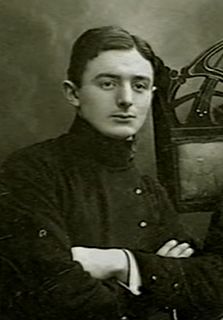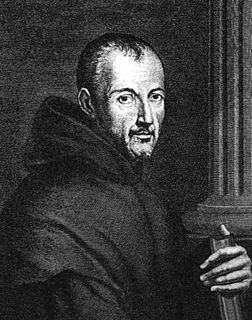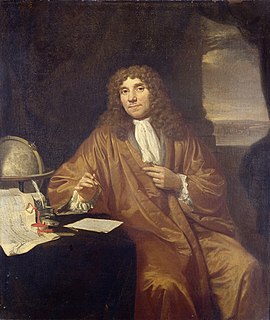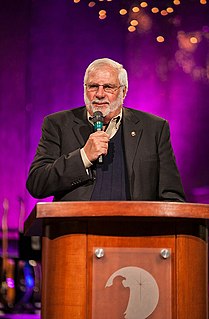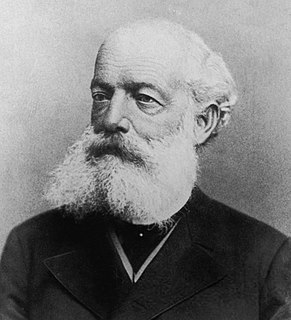A Quote by Dziga Vertov
Our eyes see very little and very badly – so people dreamed up the microscope to let them see invisible phenomena; they invented the telescope...now they have perfected the cinecamera to penetrate more deeply into the visible world, to explore and record visual phenomena so that what is happening now, which will have to be taken account of in the future, is not forgotten.
Related Quotes
God is one among several hypotheses to account for the phenomena of human destiny, and it is now proving to be an inadequate hypothesis. To a great many people, including myself, this realization is a great relief, both intellectually and morally. It frees us to explore the real phenomena for which the God hypothesis seeks to account, to define them more accurately, and to work for a more satisfying set of concepts.
Our alleged facts might be true in all kinds of ways without contradicting any truth already known. I will dwell now on only one possible line of explanation, - not that I see any way of elucidating all the new phenomena I regard as genuine, but because it seems probable I may shed a light on some of those phenomena. All the phenomena of the universe are presumably in some way continuous; and certain facts, plucked as it were from the very heart of nature, are likely to be of use in our gradual discovery of facts which lie deeper still.
Philosophy would long ago have reached a high level if our predecessors and fathers had put this into practice; and we would not waste time on the primary difficulties, which appear now as severe as in the first centuries which noticed them. We would have the experience of assured phenomena, which would serve as principles for a solid reasoning; truth would not be so deeply sunken; nature would have taken off most of her envelopes; one would see the marvels she contains in all her individuals.
We have all kinds of limitations as human beings. I mean we can't see the whole electromagnetic spectrum, we can't see the very small, we can't see the very far. So we compensate for these short comings with technological scaffoldings. The microscope allows us to extend our vision into the microsphere. The telescope allows us to extend our vision into the macrosphere, the Hubble Space Telescope extends our optic nerve into space, and it allows us to mainline space and time through our optic nerve.
High Alpine meadows, like their near relatives prairie, desert and certain varieties of wetland, teach us to consider the world from a fresh perspective, to open our eyes and take account of what we have missed, reminding us that, in spite of our emphasis on the visual in everyday speech, we see so very little of the world.
People who look for the first time through a microscope say, 'Now I see this, and then I see that,' and even a skilled observer can be fooled. On these observations I have spent more time than many will believe, but I have done them with joy, and I have taken no notice of those who have said, 'Why take so much trouble,' and, 'What good is it?'
The question whether atoms exist or not... belongs rather to metaphysics. In chemistry we have only to decide whether the assumption of atoms is an hypothesis adapted to the explanation of chemical phenomena... whether a further development of the atomic hypothesis promises to advance our knowledge of the mechanism of chemical phenomena... I rather expect that we shall some day find, for what we now call atoms, a mathematico-mechanical explanation, which will render an account of atomic weight, of atomicity, and of numerous other properties of the so-called atoms.
The hypotheses which we accept ought to explain phenomena which we have observed. But they ought to do more than this; our hypotheses ought to foretell phenomena which have not yet been observed; ... because if the rule prevails, it includes all cases; and will determine them all, if we can only calculate its real consequences. Hence it will predict the results of new combinations, as well as explain the appearances which have occurred in old ones. And that it does this with certainty and correctness, is one mode in which the hypothesis is to be verified as right and useful.
It is unlikely that we will ever see a star being born. Stars are like animals in the wild. We may see the very young, but never their actual birth, which is a veiled and secret event. Stars are born inside thick clouds of dust and gas in the spiral arms of the galaxy, so thick that visible light cannot penetrate them.
I do believe that when we're in the process of dying, that all these emergency circuits in the brain take over. I base what I'm saying not on any empirical evidence. I think it's very possible that when you're dying, these circuits open up, which would explain this whole white-light phenomena - when people clinically die and they see their relatives and stuff and say, "Hello, it's great to see you."
In experimental philosophy, we are to look upon propositions inferred by general induction from phenomena as accurately or very nearly true, notwithstanding any contrary hypotheses that may be imagined, till such time as other phenomena occur by which they may either be made more accurate or liable to exceptions.
